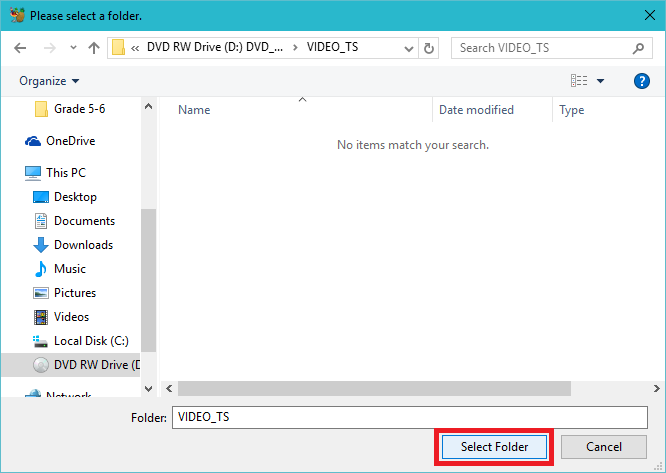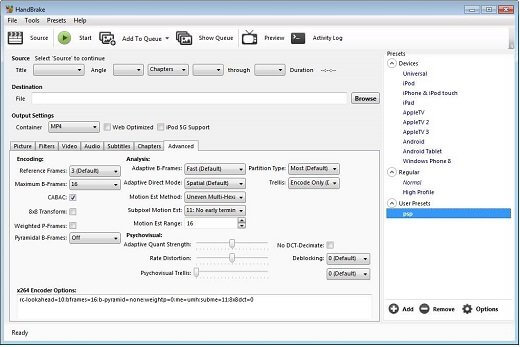

- Handbrake mp4 software#
- Handbrake mp4 plus#
- Handbrake mp4 tv#
- Handbrake mp4 download#
- Handbrake mp4 mac#

Handbrake mp4 download#
Visit HandBrake's site to download a copy. Even if HEVC's not an option, you'll still get great-looking results, and much smaller files, with H.264 compression.
Handbrake mp4 mac#
On an aging 2012 Mac mini, I still got compression speeds between 0.25x and 0.33x real time. Good news for folks with older hardware: You can still use VideoToolbox for H.264. HEVC, VideoToolbox, 4000kbps: 0.4x real time, 205.6 MB.But on average, my tests found that constant-quality HEVC ran about 35% smaller than equivalent H.264.)
Handbrake mp4 software#
Handbrake mp4 plus#
Here's a quick comparison of approximate file sizes using different compression methods, plus encode times relative to the actual length of the original clip. (As I write this, it's not clear whether that limitation comes from the chips themselves, or the software talking to them.) You can also use average bitrate when compressing with software, but given the massive speed boost you get from VideoToolbox, that's not nearly as tempting an option.

VideoToolbox's hardware-accelerated compression is a whole lot faster, ranging from "impressively" for HEVC to "insanely" for H.264, but it can only use average bitrate. Thus, if you want the smallest possible file size with HEVC, you'll have to wait a looooong time, unless you're rocking one of Apple's tricked-out, professional-grade, cost-of-a-small-car high-end Macs. At the same general quality, HEVC produces smaller files than H.264.įor constant-quality encoding, Handbrake can't use hardware acceleration, so it's stuck doing the math in software. Basically, the higher the bitrate, the better your video looks, and the bigger the resulting file is.Īt the same bitrate and file size, HEVC looks better than H.264. This results in smaller final file sizes - but while it looked pretty good to my untrained eye, the resulting picture quality might not match that of your second option.Īverage bitrate keeps the amount of compression within a much smaller range, hovering around a target you set. Then it adjusts how much compression it applies scene-by-scene to hit that quality mark. Constant quality asks you how close to the original, uncompressed file you want the compressed version to look. To make a very, very long story short, you have two options when compressing a video with H.264 or HEVC. (Big thanks to transcoding wizard Don Melton for his expertise on this next part.) HandBrake 1.2.0 and later enables Apple's VideoToolbox technology to dramatically speed up H.264 (and, for users of post-2017 Macs, HEVC) encoding … but there's a slight catch. Again, the trade-off here boils down fairly simply: a longer wait for smaller files, or a much shorter wait for somewhat larger ones. Once you've picked an algorithm, you need to decide how you're going to apply it to your video. They're generally considered comparable in quality to H.264 and HEVC, respectively. (Note that on some newer, faster computers, HandBrake will also offer Google's VP8 and VP9 encoders. And both held up no matter what I threw at them, from animated movies to black-and-white classics to films with lots of fast action and bright colors.
Handbrake mp4 tv#
In my tests, both H.264 and HEVC looked remarkably close to the original, even on a big TV screen. Older Macs can play HEVC files just fine, but only the newest models have chips fast enough to encode HEVC decently. If you don't have a Mac made from 2017 onward, stick with H.264. H.265 or HEVC makes files even smaller - but requires hefty processing power to crunch the necessary numbers. Tried-and-true H.264 converts relatively quickly, and it can squeeze a high-def Blu-ray file onto a DVD's worth of space or less. The first two aren't worth considering with the latter two available. HandBrake offers a choice of four compression algorithms: MPEG-2 (oldest, relatively lousy), MPEG-4 (still old, not great), H.264 (old, faster, pretty good), and HEVC/H.265 (new, slower, even better). HEVC: Which compression algorithm is best? Let's discuss a couple of the choices you'll need to weigh before you start putting your videos through the wringer.


 0 kommentar(er)
0 kommentar(er)
